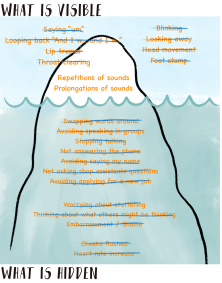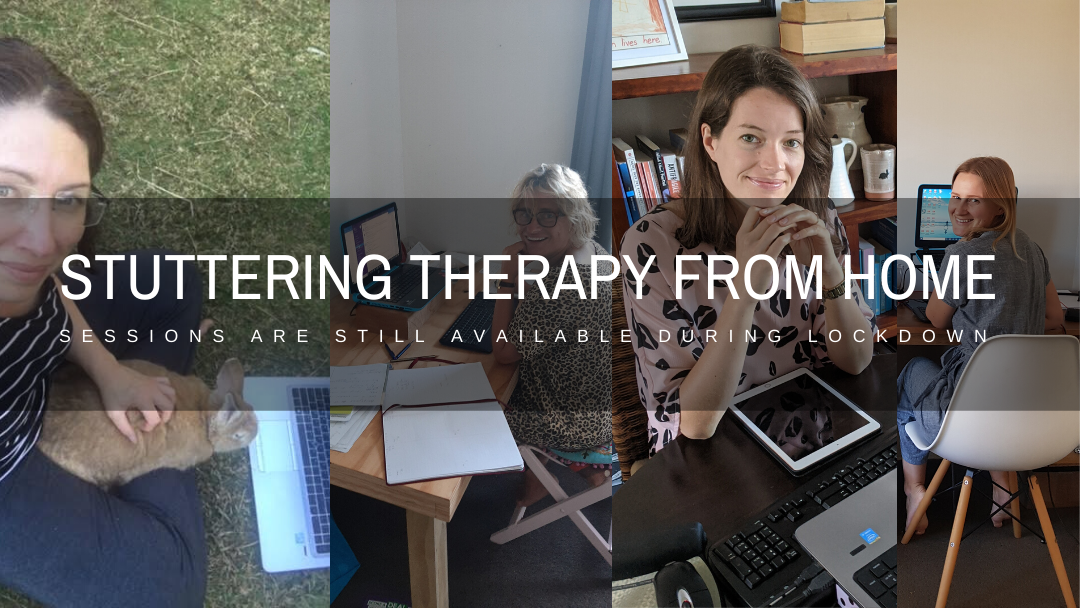Janelle Irvine (Executive Director) and Dean Cook (Board Member) from the Stuttering Treatment and Research Trust (START) were interviewed on Breakfast on TV1 on 12 February to discuss The Genetics of Stuttering Study. It was also a great opportunity to talk more about stuttering with Dean sharing some great suggestions of how to interact with a person who stutters.
Book Recommendation: Just Ask! Be Different, Be Brave, Be You by Sonia Sotomayor, illustrated by Rafael Lopez
Award winning children’s book Just Ask! Be Different, Be Brave, Be You is a beautifully written and illustrated book reminding us that we’re all unique and our differences are our superpowers – including stuttering! Likening people to flowers – each unique, growing in different ways and needing different things to thrive – this book helps build acceptance and understanding, and normalises the experience of being different.
The author Sonia Sotomayor, an Associate Justice of the Supreme Court of the United States, was inspired by her own experiences of living with Type 1 Diabetes, to educate others on the experiences of those with disabilities and differences.
The story begins with the author herself, Sonia who gathers the courage each day to prick her finger to test her blood sugar levels. The following pages share the experiences of those with dyslexia, asthma, ASD, Down Syndrome and more, highlighting their powers – their strengths, while also acknowledging some of the challenges that may come along with it.
Midway through the book we meet Anh, who has a stutter. Anh repeats words, gets stuck when she’s speaking and sometimes takes a bit longer to express herself. A simple explanation of what it’s like to stutter, perfect for a book like this. The character is a female, a refreshing change from the many children’s books with male characters who stutter.
Anh’s strength is her good listening which is my only qualm with this book. People who stutter can be good listeners, but highlighting this as her power, implies that the flip side of communication – speaking, can’t be a strength. Flow of speech is a tiny slice of the communication pie, and having a stutter does not equate to poor communication. I’d love to see a character with speaking as their strength – to show young people who stutter that they can be awesome communicators!
As the title suggests, this book encourages children to ask questions if they are curious about someone else, while respecting that not everyone is comfortable answering them. Misunderstanding is a large contributor to stigma, so this is a great skill to instil in children from a young age. Many of the young people we work with are asked questions about their speech… “Why do you talk like that? or “Why do you say but but but?”. Curiosity can be easily mistaken as meanness. Young people may need to be taught that people usually ask questions because they’re curious, and giving them an informative answer is the best way to educate them and help create a more accepting and supportive environment.
Questions you could ask your child while reading Just Ask! together
- Do you mind when kids ask you questions about yourself?
- What questions do kids ask you? Do they ask you about your speech/stutter?
- What could you say if someone asked you about your stutter? What do you want them to know?
- What are your superpowers? What are some of the things you’re good at?
- Is there anyone at preschool/school who you have a question for? How could you ask them about that?
- What do you think the world would be like if people were all the same?
We’ve recently added this book to our collection at START and we think it’s a wonderful addition to the bookshelves of those who stutter, educators and therapists. It’s a great reminder that it’s ok to stutter and it’s ok to be different. After all, the world would be a boring place if everyone was the same.
Available at libraries in these areas: Auckland, New Plymouth, Tauranga City, Western Bay of Plenty, Napier, Palmerston North, Wellington, Christchurch, Dunedin and Central Otago and Lakes. You can also request your local library to source a copy.
Also available in New Zealand at:
https://www.paperplus.co.nz/shop/books/childrens-books/non-fiction/general/just-ask-745852
Celebrating the Unsung Heroes: A Teacher’s Impact on My Journey
To celebrate Teacher’s Day (October 5th) this year, we have a story we’d like to share with you which demonstrates the impact teachers can have on our lives. Recently, Zheen Abdullazada shared with us a pivotal moment in her teenage years that has had a lasting impact and we’d like to share it with you.
“As a little girl, I dreamt of becoming a lawyer. I was a talkative kid and my family never made me feel there was something ‘wrong’ with me so I didn’t know I had a ‘stutter’ until I started school – when peers started bullying me for something I didn’t understand.
I remember feeling like I couldn’t be a lawyer because I thought I sounded stupid and incoherent when I talked. Despite the challenges of public speaking, I didn’t shy away from raising my hand in class or giving speeches, even though my stutter made these experiences daunting. Sometimes, I would stutter for minutes on a word and my throat would physically hurt.
It wasn’t until my Year 12 English teacher, Mrs Taylor, took me aside one day and told me about START. In January 2015, when I was 16 years old, I attended a week-long course specifically for teenagers who stutter. This connected me with a group of incredible young people. Together we formed deep bonds and learnt invaluable information about stuttering and useful speech techniques that I still use to this day. I owe my accomplishments to Mrs Taylor and START – without them, I wouldn’t have the tools, confidence and support to pursue my dreams.
It’s easy for someone with a stutter to allow it to dictate their life and choices – START encourages and fosters the opposite. The course I attended at START during those important years at high school transformed my life. It taught me how to ‘manage’ my stutter instead of letting it ‘control’ me and I’ve never forgotten that it’s all thanks to Mrs Taylor for letting me know about START in the first place.
Fast forward to 2023 – I’m now 24 years old and recently graduated from the University of Auckland with a Conjoint Law and Arts Degree, double majoring in Politics and International Relations, and Criminology. I’ve just finished my professional legal studies course and I work as a litigation lawyer for a law firm in Tāmaki Makarau. I’ve recently joined the START Board as a Shadow Board Member so that I can learn how a Board works and give back to the organisation that’s given so much to me.
When I look at all of these accomplishments I’m brought back to that moment at high school where Mrs Taylor took the time to connect with me on a deeper level, and got me the help I needed – a great teacher can have a life changing impact”.

Zheen Abdullazada
We know and appreciate the impact teachers can have. With many more stories just like Zheen’s, we know how helpful supportive teachers can be in the lives of young people who stutter.
Brush up on your knowledge about stuttering and how to support students who stutter in our FREE Teachers Resource here, or check out our page specifically for teachers to learn more about stuttering here.
Navigating Christmas
Kia ora, I’m Felix, a social worker at START and a person who stutters.
Christmas is a festive but often busy time of year. We’re looking forward to a well-deserved summer holiday and spending quality time with family and friends but before then, there’s often a lot of “social” events which can be a bit stressful and worrying for some people who stutter.
I explained in my previous blog that social gatherings can be intimidating and tricky to navigate for people who stutter for various reasons. So, if you’re a person who stutters and you’re feeling a bit worried about the social demands of Christmas some of the suggestions below might be helpful for you.
- Before you arrive at an event or gathering, remind yourself that our reactions to our own stuttering moments and how we continue conversations makes a real difference to us and our confidence, and has an influence on the listener and their reaction too. So, how do you react to and deal with your stuttering moments when they happen? What are you happy with? Is there anything you would like to do differently?
- If bigger groups worry you (e.g. work Christmas parties), try to have one conversation at a time. Talk with a person you trust and feel comfortable with first. This can help you settle in, and give you time to relax as your build up your confidence to socialise with others.
- Try to stick to your own pace, pitch and tone of voice, which aligns with my previous point. Don’t let yourself get rushed. Adapting to other people’s speech patterns can be distracting and throw you off balance.
- Take regular breaks, e.g. take a breath of fresh air and remind yourself of all the aforementioned tips and tricks. This can be helpful if you notice you’re becoming a bit tense and stressed and your stuttering is increasing.
- Be kind to yourself and remember you’re not at the work Christmas party or family get together to speak as fluently as possible or hide your stutter as much as you can. You’re there to celebrate a successful work year, connect with your colleagues or spend quality time with your loved ones. Be mindful to not let your stutter distract you and become the focus of your interactions.
- I know we sometimes worry about not being social “enough” due to our stutter. Let me assure you, you are social “enough”! Don’t pressure yourself to be a social butterfly if that’s just not you. But at the same time it’s also fine if you enjoy being social and engaging with others. We all have different personality types with different “social” comfort zones and that’s totally okay. What matters is that you feel comfortable to communicate and say what you want to say regardless of where you are, who you are with and if you happen to have a few speech bumps along the way.
At the end of the day, Christmas is not about how much we stutter or how much we say. It’s about “togetherness”, connecting with others, thinking about what’s important to us and appreciating what we have in life. Now, go on and have fun socialising with your workmates, family and friends and treat yourself to an extra slice of pavlova – you deserve it!
Therapy for stuttering still available during the COVID-19 lockdown
Connecting with people through technology is more important now than it’s ever been before. We are incredibly fortunate to have so many different devices and apps available that enable us to connect, albeit virtually, with our loved ones, colleagues and clients during this difficult time.
The transition to working from home, and connecting with our clients via video call has been a fairly smooth one for the Speech Language Therapists at START, as we have been using Skype for stuttering therapy for a number of years. We already see approximately 30% of our clients via Skype, so we are pleased that we can continue to offer this option to all existing and new clients during this time.
Therapy via Skype has enabled us to further our reach, and provide stuttering therapy to people of all ages across New Zealand. We are no longer bound to see only Auckland based clients, and for our Auckland based clients it gives them the flexibility to avoid the traffic if needed. This is important to us, as every person who stutters in New Zealand should have access to specialist support at any time.
The current situation will look different for every household, with the capabilities and stressors for each person varying and likely changing over time. We expect that as people settle into their new routines (or lack of), and ways of living, they may find time to focus on something new. For people who stutter, or parents and caregivers of people who stutter, this may be a good opportunity to engage in or re-engage in therapy.
You may wonder what therapy via Skype looks like.
It might be hard to imagine what therapy via Skype looks like, particularly with active pre-schoolers, but one of our SLTs, Anna Hearne, who is experienced in providing therapy via Skype has the following to say. “It works just the same. Just like in a therapy session, the pre-schooler doesn’t just sit in one spot…but the parent is still there”. Children often have experience in talking to friends and family members via video call, and are usually more than willing to talk to us about their bug collections and favourite toys. For older children, teens and adults, therapy looks much the same as a face to face session.
So, just how effective is it?
Research has shown that therapy for stuttering via video call is just as effective as therapy in person.
For people interested in attending Skype therapy and provided you have a device with webcam or camera abilities, we can schedule an appointment for you. We will continue to be available to contact via phone and email.




Avoidance Reduction Therapy and its uses for people who stutter
Have you heard about Avoidance Reduction Therapy? In this blog, Beth Laurenson, one of our Speech Language Therapists, explains this therapy approach and how it can be used in treating people who stutter.
Avoidance Reduction Therapy for Stuttering (ARTS) is based on the idea that, although stuttering is thought to be a neurological difference, the struggle of stuttering in adulthood is a result of the fear of stuttering. ARTS helps a person to stutter in an easier way, and to embrace their identity as a person who stutters. The purpose of Avoidance Reduction Therapy is just that – to reduce avoidance behaviours, which increase physical struggle and promote negative feelings about speech.
The goal is not stutter-free speech, but for the individual to communicate in an easier way, and to freely participate in any activities they choose, whether they stutter or not. The individual takes on the role of a person who stutters, rather than hiding their stutter. Reported outcomes of ARTS include comfort and efficiency of speaking, confidence, and enjoyment of communication.
The ARTS approach is based on avoidance conflict theory created by Joseph Sheehan (Professor of Psychology) and his wife Vivian Sheehan (Speech Language Pathologist/Therapist). The desire to speak but also the desire to pull back results in additional behaviours, e.g. jaw jerks or closing eyes layered on top of stuttering. This often creates more struggle and intensifies the stuttering, creating “show stoppers” (stutters which last a long time and interrupt the flow of conversation). These often leave the person caught up thinking about the stutter afterwards, resulting in reduced enjoyment of communication. The fear of ‘showing’ stuttering often results in avoidance of words or situations.
ARTS works by removing additional behaviours from the individual’s stutter, leaving the core stuttering behaviours. By removing layers which increase avoidance and struggle, speech becomes easier and more enjoyable.
Here is an example of an individual’s stuttering iceberg, the elements which are removed during ARTS crossed out.

What does ARTS look like?
ARTS is based on each individual’s needs. Weekly assignments are created which work towards easier stuttering, and speaking freely (saying what you want when you want).
Examples of specific goals may be to:
- increase eye contact
- systematically reduce additional movements which occur during stuttering e.g. head/body movements
- decrease word avoidance by putting the stutter where it should be
- speak to a range of different people in different situations (with specific goals in mind e.g. earlier in therapy, answering the phone may be the measure of success, whereas later in therapy answering the phone and stuttering freely without word avoidance may be the measure of success).
ARTS is not a quick fix, and involves facing fears. However, the outcomes promote long term comfort and enjoyment of communication, without using tools or techniques to cover up stuttering. Many people note increases in natural fluency as a by-product of ARTS, as natural fluency often comes to those who do not value it.
What is a stutter? Common myths and misunderstandings.
Debunking common myths around stuttering
Although nearly everyone knows the word, unless you are a person who stutters, there can be a number of myths and misconceptions surrounding what a stutter really is.
Before we get into what stuttering is not, why don’t we start with what stuttering is?
Stuttering is an involuntary interruption to the flow of talking. This can occur in different ways:
Repeating sounds or syllables, e.g. “B b b but it’s my turn”
Repeating words, e.g. “Can can can I be next?”
Prolongations (or stretching sounds) “That fffffffish is swimming”
Blocks “I…….I like vanilla”
The severity and type of stuttering may vary in different situations and from person to person. Interruptions to the flow of speech may be accompanied by signs of tension and struggle, as well as fear, embarrassment, and anxiety. In some cases, stuttering can dominate a person’s view of themselves and their social and work relationships.
What causes it?
We do not know exactly what causes stuttering. Stuttering is thought to be a physical disorder, most likely resulting from a problem in the neural processing area involved in speech production. It also appears that a genetic pre-disposition may be involved, as stuttering often runs in families.
Is there a cure?
There is no known ‘cure’ for stuttering. There are a variety of effective treatments available for children and adults who stutter but there is no ‘magic pill’ or cure for stuttering. The best results are achieved when the stuttering is treated early in childhood, preferably before a child starts school.
So, there are the facts. But there are also a lot of common misconceptions about stuttering. We’d like to debunk a few of these.
People who stutter do so because they are nervous, stupid, or shy
This is not true. Stuttering is not caused by anxiety but rather having a stutter may make the speaker feel more anxious as they cannot predict when they will stutter or how other people will react to their stutter. People who don’t stutter often associate stuttering with feeling nervous because most people experience ‘fluency breakdowns’ when talking to a large audience or when under time pressure. Even more important to note, is that a stutter has no relation to a person’s intelligence.
Stuttering is caused by emotional or physical trauma or stress
Stress and trauma can often make it more difficult for people who stutter to speak fluently, however they are generally not the cause of the stutter itself. Although there are some instances where physical trauma has caused a stutter (such as comedian Drew Lynch, who began to stutter after getting hit in the throat by a softball), these situations are fairly uncommon.
The reason why people stutter is still relatively unknown, but it usually develops during early childhood, and has links to genetics.
Stuttering and stammering are two different things
Although we often hear that someone has a stammer, and not a stutter, these are actually both the same thing! They are simply different words used by people who speak American English, and British English. Much the same way British English people might call this a scone, and an American English person might call it a biscuit:

We’ve actually written an entire blog post on how stammering and stuttering are different, which you can check out here.
If you’re a person who stutters, we’d love to know what the most common myth you hear is! And if you aren’t a person who stutters, did you learn something new today?
Why don’t I stutter when I speak with an accent?
Why speaking differently can make your stutter disappear
If you are a person who stutters, you may or may not have noticed that when you put on an accent, or deliberately speak differently to how you might usually speak, that your stutter is less evident, or has even disappeared completely!
This is a well-known anomaly, and was even documented on The Project last year, by a Rotorua man who discovered he no longer stuttered when he spoke in an Irish accent.
Although it is common for people who stutter to experience this, and it’s known to occur, there is still little conclusive information as to why it happens.
Last year, we discussed why you don’t stutter when you sing, and you’ll find that the information regarding these two phenomena is fairly similar. Both singing and putting on an accent are different ways to change your voice and how you sound.
This might not sound all that linked to stuttering, however there are a few reasons why it is believed to affect how you talk.
Accents make you use your brain and mouth differently
 There has been some research on the phenomenon, with The University of Iowa concluding that “music is an activity in which you use the right side of the brain (language uses the left), so when you sing music, you’re no longer using your left brain (and probably no longer stuttering).”
There has been some research on the phenomenon, with The University of Iowa concluding that “music is an activity in which you use the right side of the brain (language uses the left), so when you sing music, you’re no longer using your left brain (and probably no longer stuttering).”
It could potentially be understood that this is similar to what is happening when you put on an accent.
Another theory, is that you are using your mouth and vocal cords differently when you put on an accent. Accents, like singing, require us to make different shapes and pronounce words differently to how we might usually. When putting on an accent, you may have to emphasise sounds and letters differently to your normal way of speaking, and as a result you may find this reduces your stutter.
So why not put on an accent all the time?
If you are a person who stutters, who has found that putting on an accent reduces your stutter, you might be considering speaking in an accent for the rest of your life. However, as a long-term solution this isn’t something our Speech Language Therapists necessarily encourage.
This is for two main reasons:
The first, is that as you use the accent more and more, this will become your normal speaking voice, and therefore the reduction in stuttering may not last in the long term.
The second reason, is that not only is it unreasonable to expect someone can put on an accent 24/7 in order to mask their stutter, it’s ultimately masking who they are.
Your stutter is part of who you are, and while an Irish accent might be fun every now and then, unless you are Irish then this accent is not part of who you are.
We know it’s been said many times before, but be yourself!
Is stuttering genetic?
For the most part.
We know that’s not the most clear answer, however stuttering is quite a complicated condition that experts still don’t know everything about – as a result, answers to seemingly simple questions can be quite lengthy.
When people discuss genetics, they often are asking if there is one single gene that dictates whether a person stutters, is deaf, has blue eyes etc and if these genes are passed down among relatives. However, genetics is far more complicated than that, and often there are numerous – if not hundreds – of genes that dictate even the smallest of attributes. And of course, not all personal attributes are related to genetics.
However, when it comes to stuttering, what we know is that in most? – but not all – instances, stuttering is genetic, in that it was passed down through family members.
In what situations does this happen?
 Anna Hearne, our Massey University -based Speech Language Therapist says “children who stutter often have a family history of stuttering however the relationship between genetics and stuttering is far from clear. About 70% of those who stutter have a family history of stuttering, so a family history isn’t necessary for stuttering to develop. There are even cases of identical twins, who share the same genetic material, where one twin stutters and the other doesn’t.”
Anna Hearne, our Massey University -based Speech Language Therapist says “children who stutter often have a family history of stuttering however the relationship between genetics and stuttering is far from clear. About 70% of those who stutter have a family history of stuttering, so a family history isn’t necessary for stuttering to develop. There are even cases of identical twins, who share the same genetic material, where one twin stutters and the other doesn’t.”
If you are person who stutters, then there is approximately a 70% chance that there is a person in your family who also stutters. However your stutter may not necessarily look (or sound) identical to theirs. Simply because they are more likely to stutter with certain words, letters, or sounds, or their stutter involves prolonged sounds or repetitions, does not mean that your stutter will also resemble this.
Another factor that makes the genetics of stuttering complicated, is that it seems to differ amongst men and women. The fact that stuttering is more likely to happen to males is something well-documented, and which we’ve discussed before, however, this ratio is far different if it is an inherited stutter. If there is a relative who stutters, then the case of inherited stuttering becomes 1 female to every 1.5 males, as opposed to 1 female to every 7 or 8 males.
This only serves to complicate the matter, and there is still plenty of research to be done around this.

Regardless, there is one thing we would like to make clear, which is that the fact that stuttering runs in families is due to genetics and not because stuttering is contagious or children are learning to stutter by copying a family member. Sometimes parents of children who stutter ask whether it’s possible that their child is subconsciously copying another person who stutters, but this is absolutely not true.
If you or someone in your family is a person who stutters, we welcome you to get in touch with us to find out how we can support you.
Is there a cure for stuttering?
The short answer is no.
There is no known cure for stuttering, and like any other speech disorder, it requires therapy and practice to treat or manage it, and while some people report that their stutter suddenly “disappears”, for most adults who stutter they will continue to do so for their entire lives.
The long answer is, however, a little more complex than that.
While there is no magic pill or cure that will stop a person stuttering, there are effective tools you can use to manage your stutter. Working with a speech language therapist who specialises in stuttering can be beneficial for people who stutter, for both their communication skills and their confidence.
Young children who stutter
 Stuttering among children is far more common than among adults with approx 10% of children developing a stutter at some stage in the preschool years. However, for unknown reasons, likely linked to the still developing brain, many pre-school children naturally stop stuttering and don’t require therapy.
Stuttering among children is far more common than among adults with approx 10% of children developing a stutter at some stage in the preschool years. However, for unknown reasons, likely linked to the still developing brain, many pre-school children naturally stop stuttering and don’t require therapy.
Stuttering is best treated during the preschool years so the best advice we can give parents is to please give us a call if your child begins to stutter. This way, we can determine whether your child needs to come in for an initial assessment (children under 6 years get their initial appointment free!), or whether parents are better to monitor their child’s stuttering for a period before we decide together if therapy is required.
Contact the START team to receive specialist advice and peace of mind knowing you’ve spoken to the experts first.
Pre-teens and teens who stutter
Generally speaking, pre-teens and teens who stutter are likely to have been stuttering since they were a child. If they have yet to speak to a Speech Language Therapist, we highly recommend you set up an appointment with one of our team so they can discuss the options available to them for help and support.
At this age, young people may have developed communication related anxiety and confidence issues as a result of their stutter. Because stuttering only affects 1% of the population, often young people have not met anyone else who stutters, and this can make them feel isolated. Meeting other people their age who also stutter is a great way to meet others who face the same challenges and therefore helps to increase confidence.
We offer courses that teach tools to manage stuttering and meet others who stutter in a supportive environment. The video below features a young teen attending one of our courses.
Adults who stutter
 Adults who stutter are likely to have been living with their stuttering since childhood. Adults who stutter are likely to have had treatment in the past (which may or may not have been helpful). However often at significant transition points such as finishing study and applying for jobs it can be helpful to review techniques and receive support from a Speech Language Therapist.
Adults who stutter are likely to have been living with their stuttering since childhood. Adults who stutter are likely to have had treatment in the past (which may or may not have been helpful). However often at significant transition points such as finishing study and applying for jobs it can be helpful to review techniques and receive support from a Speech Language Therapist.
If you are looking at re-engaging with speech language therapy, please make an appointment with one of our team so that we can discuss your options; whether your needs are around confidence, speech techniques, or meeting others who stutter. We have a range of options available such as individual therapy, intensive week long courses, a mentoring program and social opportunities.
The truth is, while many people are looking for a “cure” for their stutter, there simply isn’t a quick fix available. A more helpful way of handling or living with stuttering can be having confidence in yourself and seeing your stutter as a part of who you are rather than something you should try and ‘get rid of’ or ‘hide’. However, we recognise that it can also be very beneficial to learn techniques and tools to manage your stutter.









